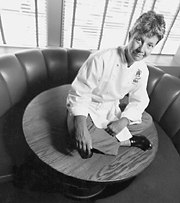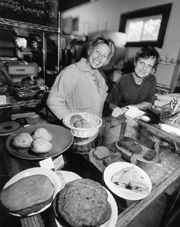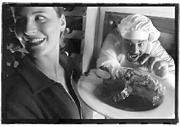for the last half-dozen years it’s been something of a commonplace that the Herb Farm is the Best Restaurant in Seattle. No matter that it’s not in, or even very near, Seattle; for purposes of the devotees who must fly in from San Francisco and New York and Madrid to sample its pleasures after reading delirious national press notices about the Fall City restaurant, it’s close enough.
The Herb Farm Restaurant at Hedges Cellars 195 NE Gilman Blvd, Issaquah; 206-784-2222 dinner Friday-Sunday by reservation only AE, MC, V ; wine
Now it’s even closer. The charming restaurant that began 13 years ago as an adjunct to Bill and Lola Zimmerman’s roadside herb stand burned to the ground two years ago, and pending tortuous (and possibly futile) negotiations with the good functionaries of that jurisdiction (and others) to rebuild, the Herb Farm Restaurant has temporarily relocated to Hedges Cellars in Issaquah. (Whispers have it that Woodinville might be receptive.) There, in the winery’s barrel room, the Herb Farm celebrated its long-awaited reopening last May. I finally snared a reservation in September.
So, that much hadn’t changed; the Herb Farm’s still as hard to penetrate as the Kremlin. But is the new, temporary Issaquah Herb Farm still the Best Restaurant in Seattle?
Let me tell you about my evening.
Upon arrival we were seated at a formally appointed table where a framed place card welcomed us by name, and the menu for the eight-course feast—”An Indian Summer,” it was grandly titled—was presented. A sunny pansy peeked out of my napkin; the butter in the silver dome dish was speckled with chives and calendulas, the warm rolls with rosemary. A smiling waiter came around to drop ice into our silver water goblets with silver tongs; another brought a planter of leafy herbs to perfume our sparkling wine. I chose lemon verbena; she plucked off a sprig and dropped it into my glass, then splashed the bubbly over it.
Oh yes, things were getting off to a rather blissful start.
Dinner began with a trio of amusements: farm-raised Pacific abalone with fresh wasabi and the deep red Japanese leaf garnish, perilla; lemony Dungeness crab and chervil salad; and a Montana paddlefish caviar tart. I was enjoying all three with gusto—particularly the respectfully treated crab and the impossibly flaky tart—even before I learned that paddlefish is a game fish like sturgeon and that the wasabi was procured from the only farm in the country—this is so Herb Farm—that grinds it fresh off the root.
These facts came out of the little dissertation that owners Carrie Van Dyck and Ron Zimmerman and chef Jerry Traunfeld delivered somewhere near the top of the meal. Traunfeld, who could wrest edible wonderment from Siberian tundra, detailed the fresh seasonal ingredients of each course he and sous-chef Matt Marshall-Dillon and their squad of five mignons would present. Then Zimmerman walked us through the liquid accompaniment, revealing a rare and lively gift for describing wine. My favorite was his description of Bacchus Vineyard’s 1998 Glen Fiona Syrah: “So lamb-friendly,” he announced, “it bounces through the fields.”
course number two was a pretty yin-yang presentation of heirloom tomato and fennel soup, crowned with a handful of the tomatoes and leafy cress. “This season we couldn’t even look at a tomato until September,” Traunfeld had lamented, but this soup made wonderful use of the Eastern Washington beauties, pairing them winningly with the spicy fennel. Next came pan-fried Mediterranean mussels, the really fat kind, served on rosemary sprig skewers with a red pepper and garlic flan and a sweet corn sauce. So Spartan is our Northwest taste for mussels we forget how deep and earthy and succulent they can be when fried; these were all that and then some, spectacularly showcased by the flan and the shimmering sweet corn sauce. Paired with a 1998 ElvenGlade Oregon Pinot Gris, this course was a masterpiece of complementing flavors, and my vote for best of show.
And the next, Alaskan halibut wrapped in leeks with wilted tat soi and apple lovage sauce, took the opposite prize. Oh, the flavors were great: The leeks left their rooty musk all over the fish, and the lovage lent a nice old-fashioned celery-like tang to the whole. But the fish was rather badly overcooked, alas—the first time I can remember encountering such a problem of execution in four visits to the Herb Farm.
A refreshing palate-cleanser followed the fish course: a cool “soup” of muskmelon and Muscat with a green scoop of spicy tarragon sorbet. As predictably grand as any of the sorbets I’ve enjoyed here—I fondly recall one made of Douglas fir needles—this sorbet beautifully showcased the Herb Farm’s prime mission: showing diners what gastronomic bliss can derive from a simple fragrant leaf.
as we waited for the main courses, we finally looked up from our plates long enough to survey the new digs. The barrel room at Hedges turns out to be a dark and rather warehousey space; lit copiously with candles and set with enough glass- and silverware to oppress Martha Stewart, the place comes off somewhere between medieval and baroque. Windowless, it conveys none of the charming garden splendor that the original Herb Farm so effortlessly did. There one could while away the pauses by strolling through the gardens; now one is likelier to notice that it takes a while—sometimes a pretty healthy while—for seven chefs to get 50 main dishes out the kitchen door.
Ah, but when they arrive! Herb-rubbed rack of lamb was topped with slices of mild, tender braised lamb tongue, alongside green beans, golden beets, and a mellow ragout of white beans and chanterelles. Perfectly conceived, blissfully cooked, this dish—tongue and all—was sublime.
A fetching little salad of greens, roasted figs in thyme honey, a thyme cracker, and a creamy cube of Quillisascut goat cheese came next, followed by a corker of a dessert. A whole poached Alberta peach (complete with an almond “pit” coated in lemon verbena-scented white chocolate) arrived drenched in a velvety lemon verbena brl饬 punctuated with fat blackberries. Heaven.
At this point they roll out the coffees, teas, infusions, and cordial glasses of 1916 Madeira; with them one can nibble on a plate of dazzling little herby afterwords, like cinnamon basil truffles, chocolate-hazelnut macaroons, and cardamom shortbread. At dinner’s end, roughly four hours have passed since you sat down.
And this diner’s verdict says that it’s as masterful a four hours of dining as you’re likely to get in Seattle (or anywhere near it), notwithstanding the teensy problems of execution, service, and decor that seem to beset the larger Issaquah operation. Still happily intact is the place’s wonderful attitude about food and service: reverent but not humorlessly so, and sincerely eager to please. When we had to make an unforeseen early exit, for example, they packaged up the last of our food and delivered it to us at the door in a ribboned box. These folks clearly know something that many other Seattle restaurants would do well to learn: When you’re going to drop a load of money on a single dinner—$338 for two, in this case—you need to leave feeling that they made sincere efforts to please you.







